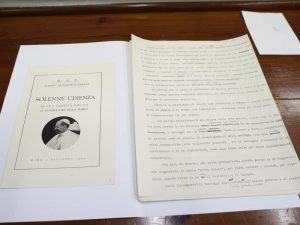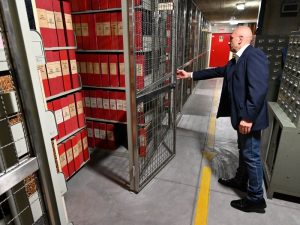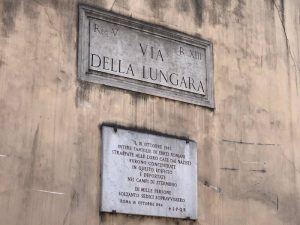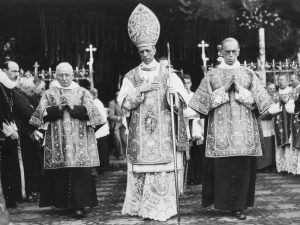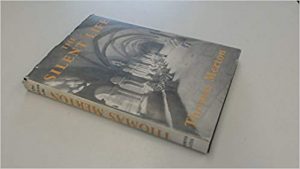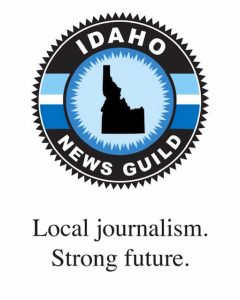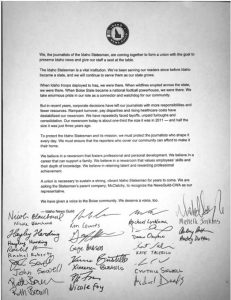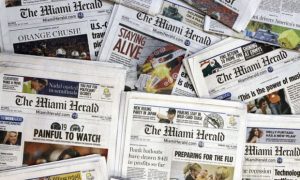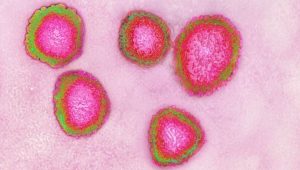“…all researchers, regardless of nationality, faith and ideology are welcome.”
March 2, 2020Pope Pius XII’s handwriting is seen on a rough draft of his speech in 1944, displayed during a guided tour for media of the Vatican library on Pope Pius XII on Feb. 27.
Gregorio Borgia/AP
NPR
Vatican Opens Archives Of World War II-Era Pope Pius XII
by Sylvia Poggioli
After decades of pressure from historians and Jewish groups, the Vatican on Monday began allowing scholars access to the archives of Pope Pius XII, the controversial World War II-era pontiff.
Roman Catholic Church officials have always insisted that Pius did everything possible to save Jewish lives. But he remained publicly silent while some 6 million Jews were killed in the Holocaust.
More than 150 scholars have applied to study documents covering his papacy, which lasted from 1939 to 1958. Typically, the Vatican waits 70 years after the end of a pontificate to open its archives to scholars.
Speaking to reporters on Feb. 20, the Vatican’s chief librarian, Cardinal José Tolentino Calaça de Mendonça, said all researchers, regardless of nationality, faith and ideology, are welcome.
“The church is not afraid of history,” he said, echoing Pope Francis’ words when he announced his intention to open the Pius XII archives a year ago.
Jewish groups welcomed the opening of the archive. “In inviting historians and scholars in to publicly access the Vatican’s World War II archives, Pope Francis is demonstrating a commitment to learning and airing the truth, as well as to the significance of Holocaust memory,” World Jewish Congress President Ronald S. Lauder said in a statement.
John Ickx, a Vatican archivist, says scholars will have easy access to the files.
“We have now passed 1 million and 300,000 documents that are digitalized and interfaced with an inventory for it, to help the researchers to go quickly,” he says.
Those researchers have been waiting a long time. A 1963 German play, The Deputy by Rolf Hochhuth, sparked questions about Pius’ wartime role and accused him of complicit silence in the Holocaust. The Vatican’s attempts to beatify him are stymied by still-vivid memories in Rome of his behavior toward the city’s Jews during the Nazi occupation.
A plaque on the wall outside a military college in Rome recalls the roundup of 1,259 Jews. It reads: “On 16 October 1943 entire Jewish Roman families ripped from their homes by the Nazis were brought here and then deported to extermination camps. Of more than 1,000 persons, only 16 survived.”
The location is just 800 yards from St. Peter’s Square — “under the pope’s very windows,” as Ernst von Weizsacker, then serving as Germany’s ambassador to the Vatican, reported back to Hitler.
Brown University’s David Kertzer has written extensively about popes and Jews. He won the 2015 Pulitzer Prize for his book The Pope and Mussolini: The Secret History of Pius XI and the Rise of Fascism in Europe, about Pius XII’s predecessor, and has reserved a desk in the Vatican archives for the next four months.
Roman Catholic Church officials have always insisted that Pope Pius XII, shown here in an undated photo, did everything possible to save Jewish lives. But he remained publicly silent while some 6 million Jews were killed in the Holocaust.
AP
Kertzer says a lot is known about what Pius XII did. Much less is known about internal deliberations during the war years in the Vatican.
“We know [Pius XII] didn’t take any public action,” he says. “He didn’t protest to Hitler. But who within the Vatican might have been urging him to do so? Who might have been advising him caution? That’s the kind of thing I think we’ll find out, or hope to find out about.”
Like many church historians, Massimo Faggioli, who teaches theology at Villanova University, is also curious about Pius’ role after World War II, during the Cold War. In particular, he wonders, did Vatican officials intervene in Italian elections in 1948, when there was a real possibility of a Communist Party victory?
“I would be curious to know so what kind of communication there was between the [Vatican] Secretariat of State and the CIA,” he says. “Pope Pius was certainly convinced that he had to defend a certain idea of the Christian civilization in Europe against communism.”
Kertzer is certain the Catholic Church was horrified by the Holocaust. In fact, several thousand Jews found refuge in Catholic convents in Italy. But what he hopes to understand better from the Pius files is the role played by the church in demonizing Jews.
“The main purveyors of vilification of Jews for many decades was not the state, it was the church,” he says. “And it was vilifying Jews right up through the ’30s and right up to the beginning of the Holocaust, if not into it, including Vatican-related publications.”
This, Kertzer says, is what the Vatican needs to come to terms with.
https://www.npr.org/2020/03/02/811170588/vatican-opens-archives-of-world-war-ii-era-pope-pius-xii
Faith in Youth
The world of our time is in confusion. It is reaching the peak of the greatest crisis in history. Never before has there been such a total upheaval of the whole human race. Tremendous forces are at work: spiritual, sociological, economic, technological and, least of all, political. Mankind stands on the brink of a new barbarism, yet at the same time there remain possibilities for an unexpected and almost unbelievable solution, the creation of a new world and a new civilization, the like of which has never been seen. We are face to face with Antichrist, or the Millennium (Millennials!), no one knows which.
-Thomas Merton, The Silent Life, 1957
#LocalNews
From Don Day in Boise. Don has been covering news in Boise for 20 years. He is a National Edward R. Murrow Award winner and a Stanford University John S. Knight Fellow.
‘All eligible editorial staff in the Idaho Statesman newsroom intend to for a union, the group said Monday.
In a letter signed by 16 non-management members of the Statesman’s news staff, the journalists said the intent of the union is to “preserve Idaho news and give our staff a seat at the table.”
Each of the members signed a mission statement and said they delivered it to Statesman publisher Rusty Dodge’s assistant.
The union hopes McClatchy, which owns the Statesman, will voluntarily recognize the organizing effort. Several other McClatchy papers, including the company’s flagship Sacramento Bee, use union labor. If not, the group says it will vote in the next several weeks to form a union among eligible employees. The NewsGuild, part of the Communications Workers of America, will represent the Idaho News Guild, as the group calls itself.
A message to Dodge seeking comment was forwarded to McClatchy’s corporate PR department. A spokesperson did not respond to specific questions, but did provide a statement:
“The Idaho Statesman and McClatchy are reviewing a letter from our journalists in Boise sharing their intention to form a union. We appreciate the right of our journalists to be represented by the News Guild-CWA and will consider their request and respond shortly.”
McClatchy, which entered bankruptcy protection last month, repeatedly cut the newsgathering capabilities of the capital city’s oldest news organization. It faces pressure for a severe downturn in print advertising revenue, plus intense competition for digital advertising from Google and Facebook. The company in recent years aggressively turned to build a stronger digital subscription business to stem the losses.
Idaho is a so-called “right-to-work state,” which means a union can’t require employees to join or pay dues in order to get a job. If McClatchy recognizes the union, or a vote to form proves successful, the guild could gain collective bargaining rights over issues like wages, healthcare costs, and other labor issues.’
https://boisedev.com/news/2020/03/02/idaho-statesman-idaho-news-guild
Idaho News Guild:
Thus far, our union has unanimous support from our 16 eligible members. Each of us signed our mission statement, which we delivered to our publisher today.
Maintaining public media infrastructure should be non-negotiable for a democratic society. We have to be bold.
The McClatchy newspaper chain’s recent filing for bankruptcy is one more data point showing that US journalism is dying. According to the US Bureau of Labor Statistics, the newspaper industry has lost more than 50% of its employees since 2001. While several big national papers like the New York Times are healthy, more typical are the closures, bankruptcies, and extreme downsizing that increasingly leave cities, towns and rural communities without local news.
Meanwhile, little evidence suggests that any new market-driven model can rescue newspapers or sustain the journalism that democracy requires. For many areas across the US, there’s simply no commercial option. The market has failed us.
This carnage has attracted opportunistic pathologies, from hedge funds buying up distressed papers and selling them for parts, to news outlets resorting to increasingly dubious forms of advertising and clickbait. A degraded product gives readers even less reason to support local news.
ut tackling the journalism crisis at a systemic level – bringing sustenance to “news deserts” where rich benefactors and foundations are unlikely to go – requires a large public media fund. How do we create it?
Ideally, we’d massively increase federal support for public media. Whether we expand or replace the PBS model is an open question, but this new system must provide for information needs across all types of digital media and platforms.
Maintaining public media infrastructure should be non-negotiable for a democratic society. Short of paying directly out of the treasury, government could help facilitate multiple revenue streams into one large fund. Two objections typically arise: its cost and its relationship to government.
Regarding independence from government, opposition to public media is often ideological, not grounded in empirical evidence. An extensive record shows publicly-subsidized media existing comfortably in democratic countries around the world. Research suggests that public media often are no less critical of government than their private counterparts, and they correlate positively with strong democracies.
Even the US has long subsidized media infrastructure, from the postal system to the internet. Nonetheless, there are legitimate concerns about state capture – just as there are with commercial capture – and yet many democracies have figured out how to make this work. Safeguards and firewalls are both necessary and feasible.
The next question is how do we pay for it? Many options exist. We could raise funds from taxing platforms like Facebook and Google, placing levees on communication devices, and repurposing international broadcasting subsidies. Other sources include spectrum sales and individual tax vouchers. We could leverage already-existing public infrastructures such as post offices, libraries, and public broadcasting stations to provide spaces for local news production.
https://www.theguardian.com/commentisfree/2020/feb/19/american-journalism-press-publishing-mcclatchy
COVID-19
Bill Gates sets grim tone on virus
Bill Gates, who has devoted much of his life and fortune to global health, warns in The New England Journal of Medicine that the coronavirus “has started behaving a lot like the once-in-a-century pathogen we’ve been worried about”:
The big picture: Gates, always an optimist, writes that in addition to responding to this crisis, “we also need to make larger systemic changes so we can respond more efficiently and effectively when the next epidemic arrives.”
New England Journal of Medicine article:
https://www.nejm.org/doi/full/10.1056/NEJMp2003762
From the World Health Organization [WHO]:
What every country should be asking itself
Discussing preparedness for COVID-19, the WHO Director-General listed questions every health minister should be able to answer. Here are a selection:
-
Are we ready for the first case?
-
Do we have enough medical oxygen, ventilators and other vital equipment?
-
How will we know if there are cases in other areas of the country?
-
Do our health workers have the training and equipment they need to stay safe?
-
Do we have the right measures at airports and border crossings to test people who are sick?
-
Do our labs have the right chemicals that allow them to test samples?
-
Are we ready to treat patients with severe or critical disease?
-
Do our hospitals and clinics have the right procedures to prevent and control infections?
-
Do our people have the right information? Do they know what the disease looks like?
Dr. Matt McCarthy, NY Presbyterian Hospital on Coronavirus:
“We are not testing at full capacity and that is a national scandal. We’re being told that things are ok…that’s just not the way we’re talking about it in medical circles.”
#CoronaOutbreak
Dr. Anthony Fauci, US director infectious disease:
“We’re dealing with clearly an emerging infectious disease that has now reached outbreak proportions and likely pandemic proportions.”
‘Last Week Tonight’ host Jon Oliver shared this video taking hold in Asia and shown in the 3.1.2020 episode.
https://www.youtube.com/watch?v=tZ_xLivVtjM
From comedian and late night host Jimmy Kimmell:
‘Washing your hands is very important. Jimmy wanted to make sure he was doing it right, so we got in touch with a doctor at the Mayo Clinic in Minnesota named Dr Poland. He is a specialist in infectious disease and he flew all the way to LA just to teach Jimmy and Guillermo how to wash.’
